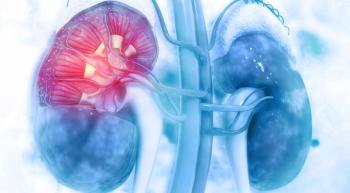
Fast Track Status Given to ADRX-0706 for Squamous Cell Cervical Cancer
ADRX-0706 has received FDA fast track designation for the treatment of metastatic or locally advanced squamous cell cervical cancer.
The nectin-4–targeted antibody-drug conjugate (ADC) ADRX-0706 has received FDA fast track designation for use in patients with locally advanced or metastatic squamous cell cervical cancer.1
The agent is currently being investigated in patients with select advanced solid tumors—including cervical cancer—in a phase 1 trial (NCT06036121). Interim data from the complete dose-escalation portion of the study will be presented at the
“The fast track designation granted by the FDA underscores the significant unmet need in advanced cervical cancer and marks another meaningful milestone for Adcentrx,” Hui Li, PhD, founder and chief executive officer of Adcentrx Therapeutics, stated in a news release. “This recognition, together with the early clinical signals observed for ADRX-0706, reinforces the best-in-class potential of our nectin-4 ADC and provides the opportunity for enhanced regulatory dialogue as we continue advancing this important program through clinical development.”
ADRX-0706 is comprised of a novel fully human IgG1 that targets nectin-4, which is linked to a proprietary tubulin inhibitor payload, AP052, using the i-Conjugation platform from Adcentrx. The ADC has a drug-antibody ratio of 8.
Nectin-4 is a cell surface adhesion protein that is highly expressed on various solid tumors and has limited expression in normal tissue. The protein is also associated with poor prognosis, and it has been established as a validated target for ADCs.
During phase 1a dose-escalation portion of the 2-part, multicenter, open-label phase 1 study, investigators are enrolling patients at least 18 years of age with histologically confirmed select advanced solid tumors, including urothelial carcinoma, head and neck squamous cell carcinoma, breast cancer, cervical cancer, ovarian cancer, non–small cell lung cancer, and pancreatic cancer.2 In dose expansion in phase 1b, patients need to have urothelial cancer, triple-negative breast cancer, or cervical cancer who experienced disease progression after at least 1 prior line of systemic therapy regimen with no standard treatment options available. All patients in both phases are required to have measurable disease per RECIST 1.1 criteria, an ECOG performance status of 0 or 1, and adequate organ function.
Investigators are excluding patients with active and uncontrolled central nervous system metastases; significant cardiovascular disease; a history of another malignancy within 3 years of study enrollment; treatment with any anticancer or investigational agent within 5 elimination half-lives or 14 days of study entry; and treatment with any P-glycoprotein inducers or inhibitors, or strong CYP3A inhibitors, within 14 days of the first dose of study drug. Notably, systemic antimicrobial treatment for active infection is not allowed, but routine antimicrobial prophylaxis can be administered.
Part 1a is evaluating ADRX-0706 at escalating doses with the intention of establishing the maximum tolerated dose and the recommended dose for expansion.
Safety is serving as the trial’s primary end point. Secondary end points include pharmacokinetics, overall response rate, duration of response, disease control rate, progression-free survival, and overall survival.
References
- Adcentrx Therapeutics granted fast track designation for ADRX-0706 nectin-4 ADC for the treatment of advanced cervical cancer. News release. May 6, 2025. Accessed May 9, 2025. https://www.adcentrx.com/adcentrx-therapeutics-granted-fast-track-designation-adrx-0706/
- A study of ADRX-0706 in select advanced solid tumors. ClinicalTrials.gov. Updated December 18, 2024. Accessed May 9, 2025. https://clinicaltrials.gov/study/NCT06036121
Newsletter
Knowledge is power. Don’t miss the most recent breakthroughs in cancer care.





























































































